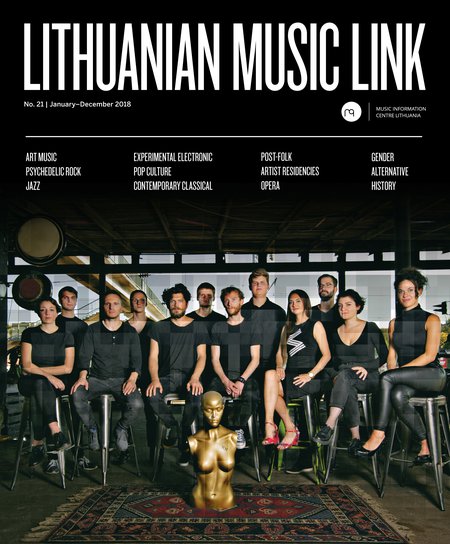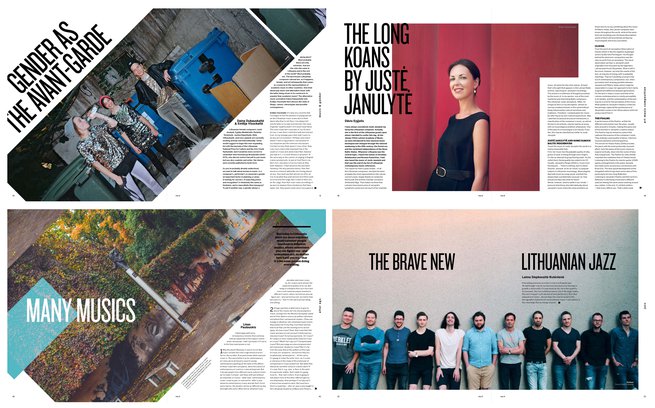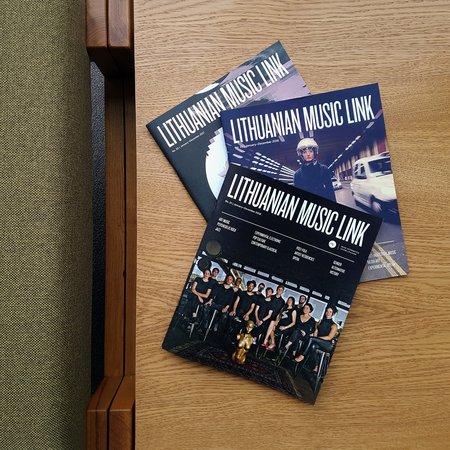Many Musics and Boldness of Spirit in the Latest Issue of the Magazine Lithuanian Music Link
- Jan. 15, 2019
Asta Pakarklytė, the director of Music Information Centre Lithuania, commented: ‘In presenting different genres and styles on the same level to an audience with different tastes and from different social environments, Lithuanian Music Link is a challenge to traditional music magazines which target a particular genre and an invitation to readers to dig deeper and find something new beyond the borders of their own musical genres. The aim of the magazine’s diverse content is to reveal as much of the structure of Lithuania’s musical ecosystem and open up the widest possible landscape of Lithuania’s music to an international audience.
The magazine’s editor Lina Navickaitė-Martinelli says that the key word to this issue of the magazine is interdisciplinarity: ‘The newest or historical expressions and personalities of Lithuanian music culture are viewed from very different perspectives not just, as is usual, by musicologists, music critics or bloggers but also by composers, theatrologists, art curators, music practitioners and other kinds of authors, whom it would be difficult to classify according to their professions and their viewpoints. The result is a wide range of topics (which undoubtedly reflects the depth and width of the music scene) and the opportunity for representatives from other fields to turn towards Lithuanian music.’
The 21st issue begins with Vaidas Jauniškis’s essay with the satirical bent typical of him on opera being boring and the various attempts to blow it up. Vytautas Michelkevičius presents a comprehensive guide to artists’ residencies, describing traumatic experiences, the type of person ‘living out of a suitcase’ who jumps from one residency to another and the creative ecosystem of thousands of residencies throughout the world. Povilas Vaitkevičius focuses on the history of the Black-Horn Mooned Festival: known as an exceptional event in Lithuania and abroad from the first spartan-like ‘night of pagan arts’ with sub-zero temperatures outside in November 1995 up to the present day.Daina Dubauskaitė and Emilija Visockaitė talk about gender stereotypes in music strongly shaken up by the winds of hipsterism: the scene became more open and listeners became more interested in strange, non-traditional sounds. It could be said that this theme is picked up and continued in Linas Paulauskis’s overview in which he presents several dozen Lithuanian chameleons who have changed their musical ‘skin’ in their creative work. A large number of these composers who can turn their hand to many things are young women who completed their studies in classical composition and, besides that, are actively involved in progressive rock, goth metal, jazz, improv, pop music, trip hop, psychedelia, fusion, and other genres. In Laima Slepkovaitė-Butėnienė’s survey of Lithuanian jazz albums, however, there are almost only men, boldly and intrepidly undertaking various publishing initiatives.
The cover of the 21st issue of the magazine is graced with a photograph of the contemporary music ensemble Synaesthesis, which, according to the author Mindaugas Urbaitis, is the most distinct Lithuanian new music collective committed to performing contemporary work and which has shown that that sort of music can be not just strange but also cool. Daina Dubauskaitė writes about the psychedelic rock group Garbanotas (‘curly-headed’) and the reasons for their success in eliciting an emotional response from their followers at home and reaching an international audience.The Latvian musicologist Dāvis Engelis writes about the Lithuanian composer Justė Janulytė whose music has been actively presented in Latvia over the last several years, thanks largely to the initiative of the conductor Normunds Šnē and the chamber orchestra Sinfonietta Rīga.
To mark the centenary of the birth of the composer Eduardas Balsys there is the text by Rūta Stanevičiūtė on his oratorio Don’t Touch the Blue Globe, a striking example of modernism in Lithuanian post-war music, falling into the context of the threat of atomic and other wars and the contradictions of ideological peace characteristic of the Cold War.
The publication of the magazine Lithuanian Music Link is one of the initiatives showcasing the international character of Lithuania’s music, implemented by Music Information Centre Lithuania, financed by the Lithuanian Council for Culture and the Ministry of Culture of the Republic of Lithuania. The free paper version of the magazine in English is distributed through various international music platforms, public cultural diplomatic environments, and Lithuanian cultural organisations working actively with foreigners or through direct contacts targeting appropriate audiences. The content of all issues is freely accessible on the website of Music Information Centre Lithuania at mic.lt.
Translated from the Lithuanian by Romas Kinka
If you are professionally involved with music and wish to get a free paper copies of the publication by regular mail, please contact us.


